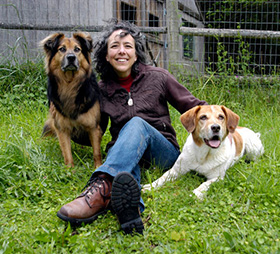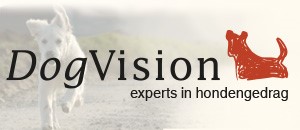
Over Kathy Sdao
Kathy Sdao is psycholoog en toegepast dierengedragsdeskundige en heeft ruim 30 jaar ervaring als dierentrainer. Ze heeft wereldwijd al honderden inspirerende seminars en workshops gegeven aan dierprofessionals. Ze deelt haar ervaringen en haar passie voor wetenschap en ze spreekt over ethiek en de kracht van beloningsgericht trainen. Lees verder onder het aanmeldformulier.
Meer over Kathy Sdao
Zeezoogdieren
In de jaren ’80 studeerde ze af aan de Universiteit van Hawaii als experimenteel psycholoog. Het onderzoeksteam waar ze deel van uit maakte trainde dolfijnen om complexe puzzels op te lossen. Na haar afstuderen heeft ze in opdracht van de Amerikaanse marine dolfijnen getraind om toegepaste taken te verrichten in de open oceaan. Hierna werkte ze 5 jaar in de Point Defiance Zoo & Aquarium in Washington. Ze trainde daar o.a. walrussen, zeeleeuwen, otters en ijsberen.
Honden
Inmiddels werkt Kathy Sdao ruim 20 jaar met honden. Ze startte samen met een collega de eerste hondendagopvang in Tacoma ‘Puget Hound Daycare’, waar ze begon met clickertraininglessen voor hondeneigenaren. In 1998 startte ze ‘Bright Spot Dog Training’. Ze begeleid sindsdien hondeneigenaren die tegen problemen aanlopen met hun hond, ze geeft privélessen en ze coacht professionals die hun vaardigheden willen verbeteren, maar ze werkt ook met cross-over trainers die willen overstappen van correctiegericht trainen naar beloningsgericht trainen.
ClickerExpo
Veel mensen kennen Kathy Sdao van Karen Pryor’s ClickerExpo. Al vanaf 2003 maakt Kathy deel uit van het oorspronkelijke team en ze krijgt ieder jaar weer lovende reacties op haar lezingen tijdens deze jaarlijks evenement. Ze staat bekend om haar enorme schat aan ervaring, haar charisma, haar humor en haar enthousiaste manier van spreken.
Kathy beschrijft haar trainingfilosofie in haar boek Plenty in Life is Free: Reflections on Dogs, Training and Finding Grace. Susan Friedman (Ph.D., Utah State University) zegt over dit boek:
This extraordinary book fills the gap between contemporary training technology and ethics. With indelible wit and wisdom, Sdao exposes the naked emperor of excessive control and replaces him with the keys to healthful behavior and lasting relationships. This book will improve more than a dog’s life—it will be required reading for the students in all my behavior classes.
Programma
Zaterdag 24 februari
| 10:00 – 12:00 | Wasting reinforcers Being a skilled reinforcer is the foundation of effective and humane animal-training. Identifying each dog’s varied reinforcers and utilizing them frequently and precisely is essential for creating long-lasting behavior change. |
| Getting the sequence wrong Sometimes one second can make an enormous difference to the efficacy of a training technique. Therefore it’s important to understand how a backwards sequence of events (as perceived by the dog) can waste time and effort and also have unwelcome side-effects. |
|
| 13:00 – 15:00 | Confounding reinforcers & punishers Most of us would say that, for our dogs, food and play are attractive while reprimands and leash-corrections are aversive. But we err when we presume that the objects and activities which a dog considers reinforcing (or punishing) are immutably so. |
| Weakening/poisoning cues Nothing improves training more than understanding what trainer-delivered cues (verbal or gestural) can do and what they cannot do. Careful creation and maintenance of clear, consistent behavioral-signals is a powerful way to be kind to your dog. |
|
| 15:30 – 17:30 | Weakening/poisoning cues (continued) |
| Allowing dog to go over threshold Sometimes the hardest part of a behavior-modification plan is deciding which activities and situations your dog is not yet ready to handle. Wise trainers develop not only a “to do” list, but a “don’t do” list as well. |
Zondag 25 februari
| 10:00 – 12:00 | Misunderstanding schedules of reinforcement Few topics in the science of learning are duller then schedules of reinforcement. Yet there are points of confusion that can lead to ineffective training techniques and “stubborn” animals. |
| Overlooking the importance of agency Agency is the capacity of individuals to act independently & make free choices. It is a key component of mental health and as such it should be integrated into our training programs and behavior-modification plans. |
|
| 13:00 – 15:00 | May the Force Be With You…Or Not We’ll discuss a different sort of force than Obi-Wan Kenobi referred to in Star Wars! We’ll examine the use of coercion in animal training. While we aim to minimize our use of aversives, it’s essential that we understand the science of punishment and be aware of its potential side effects. Is negative punishment always preferable to positive punishment? Are secondary punishers safer than primary punishers? Admitting that punishment can “work,” what are the behavioral costs to the animal and to the punisher? Our overall goal will be to bring more clarity and mindfulness to choices surrounding the use of force with our learners. |
| 15:30 – 17:30 | Non-violence: A Choice for Trainers Are we as force-free with our clients and our colleagues as we are with the animals in our care? Our behavior-consulting work often takes place amidst emotionally charged situations. The stakes can be high and our clients can be upset, argumentative and unpleasant. Additionally, these same characteristics can describe our colleagues at times. And so, when dealing with disagreeable people, can we apply our core skills of careful observation, non-reactivity, gradual shaping and timely reinforcement of alternate behaviors? Let’s consider if we are willing to extend our ethic of non-violence to include our interactions with people as well as pets, and if so, what practical changes we could make to support this. |
Blijf op de hoogte
Dit seminar heeft inmiddels al plaatsgevonden.
Wil je op de hoogte blijven van nieuwe Doggo-seminars?
Meld je dan aan voor de speciale seminar mailinglist







